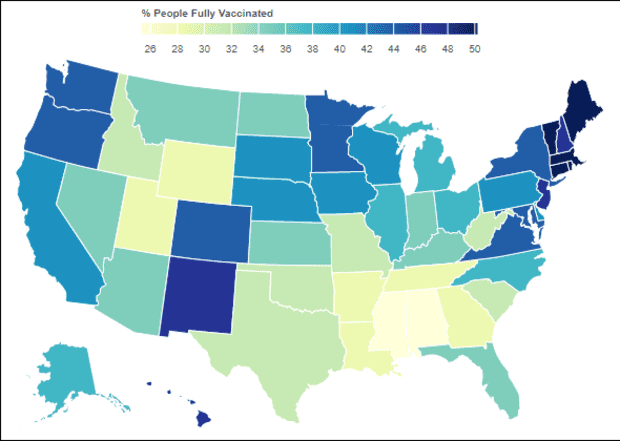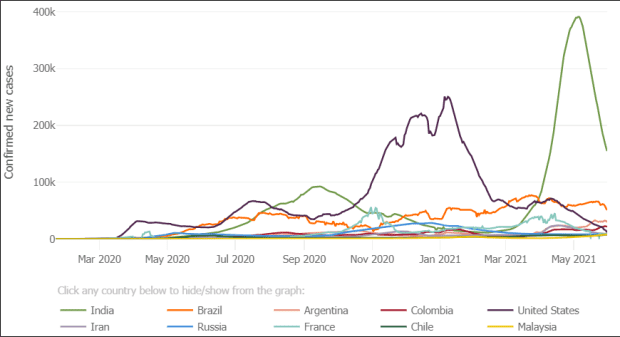This post was originally published on this site
With new daily cases of the coronavirus that causes COVID-19 dropping in the U.S. to the lowest levels seen in over a year, and with more than half of Americans having been fully vaccinated, there was a sense of a return to normalcy as the number of travelers over the Memorial Day weekend reached pre-pandemic levels.
Only 5,602 new COVID-19 cases were recorded on Monday, down from 7,428 on Sunday and 11,590 on Saturday, to hit the lowest number seen since March 19, 2020, according to New York Times data.
The daily average over the past seven days declined to 17,189, down 46% from two weeks ago, and the lowest average since March 26. (Those numbers could be underreported given reduced staffing at hospitals over the holiday weekend.)
And 45 states are showing a decline in the weekly trend of new cases, compared with 39 states the week before, according to data aggregated by Johns Hopkins University.
There were only 150 deaths recorded on Monday, while the seven-day average fell to 392, down 36% from two weeks earlier, and the first time below the 400-mark since March 2020, the NYT data show.
The drop in cases and deaths comes as vaccinations continued to increase, with 51.5% of the U.S.’s adult population now fully vaccinated, according to the latest data provided by the Centers for Disease Control and Prevention.
In total, 135.09 million Americans, or 40.7% % of the total population, have been fully vaccinated. That includes 74.8% of the population that is at least 65 years old, 51.5% of the population who are at least 18 years old and 48.2% of the population that is at least 12 years old.
In the U.S., being fully vaccinated means it has been two week since the second of the two-dose vaccines developed by Pfizer Inc.
PFE,
and its Germany-based partner BioNTech SE
BNTX,
and Moderna Inc.
MRNA,
have been administered, or it’s been two weeks since receiving one dose of Johnson & Johnson’s
JNJ,
vaccine.
Among U.S. states, Vermont leads with 50.25% of its total population fully vaccinated, followed by Massachusetts at 49.88% and Connecticut at 48.87%, while Mississippi was last at 25.37% and Alabama was next to last at 27.31%, according to JHU data.

Johns Hopkins University & Medicine
On a world-wide basis, U.S. is by far the vaccination leader, with India a distant second with 43.3 million people fully vaccinated, while the United Kingdom third at 25.5 million people.
As a percentage of total population fully vaccinated, the U.S. is seventh, while Seychelles is first at 65.6%, followed by San Marino at 61.9% and Israel at 56.7%.
Meanwhile, Moderna said Tuesday that it is formally seeking full approval from the Food and Drug Administration for its COVID-19 vaccine, which currently has been granted Emergency Use Authorization (EUA), as MarketWatch’s Jaimy Lee reported. The company is it has initiated a “rolling submission” to the FDA.
Last month, Pfizer and BioNTech said they were seeking full approval from the FDA for their vaccine in individuals who were at least 16 years old.
The good news on the daily case and vaccine front, and the loosening of restrictions across the U.S., seemed to embolden people to travel over the long Memorial Day weekend.
Data from the Transportation Security Administration showed that the number of people going through TSA checkpoints topped 1.9 million on Friday and Monday, the highest numbers since early March, and days before the World Health Organization declared the COVID-19 outbreak a pandemic.
In other news:
- The WHO said it would start using Greek letters to label new variants of the COVID-19 virus, as they consider “easy-to-pronounce and non-stigmatising” labels for variants of concern (VOC) and variants of interest (VOI).
For example, the B.1.617.2 VOC from India is now labeled “Delta,” the B.1.1.7 variant from the United Kingdom is now “Alpha,” the B.1.351 variant first detected in South Africa is Beta and the P.1 variant from Brazil is Gamma.
- Abbott Laboratories cut its full-year earnings outlook, citing declining demand for its COVID-19 tests. The diagnostics company said it now expects 2021 adjusted earnings per share of $4.30 to $4.50, below previous guidance of “at least” $5.00 and the FactSet consensus of $5.04.
There are a number or reasons COVID-19 testing volume could be declining, including increasing vaccination rates and guidance from the CDC that vaccinated Americans do not need to get tested if they are exposed to someone infected with the virus.
- Japan has extended the coronavirus emergency in Tokyo, as well as eight other prefectures, until June 20, which is about a month before the expected start of the Tokyo Olympics, according to a Nikkei Shimbun report. The emergency, which was declared on April 25, and has already been extended once this month, was set to expire next week. The move comes as polls showed that most Japanese are against hosting the Olympics this year.
- The WHO has issued an emergency use listing for the COVID-19 vaccine developed by China’s Sinovac, in adults ages 18 years and over. That comes about a month after the WHO OK’d the COVID-19 vaccine made by China’s Sinopharm.
- Krispy Kreme said that on Friday, which is National Doughnut Day, it will offer two free doughnuts to anyone who shows they have been vaccinated. That’s double the promotion started about two months ago, in which the doughnut seller said it would give one free doughnut to people who have been vaccinated. Since the promotion started, the company said it has given away 1.5 million doughnuts.
Separately, Krispy Kreme made it public that it has filed for an initial public offering.
Latest tallies
The global tally for the coronavirus-borne illness climbed to 170.80 million onTuesday, while the death toll rose to 3.55 million, according to JHU data.
The U.S. continues to lead the world in total cases with 33.27 million and deaths with 594,590.
India is getting closer to the U.S., with 28.18 million cases, but is third with 331,895 deaths.
Brazil is second in deaths at 462,791, and third in cases with 16.55 million.
Mexico is fourth by fatalities with 220,437 and 2.4 million cases.
The U.K. is fourth in deaths world-wide, and leads Europe, at 28,045, while France leads Europe in cases with 5.73 million.
China, where the virus was first discovered late in 2019, has had 103,021 confirmed cases and 4,846 deaths, according to its official numbers, which are widely held to be massively underreported.

Johns Hopkins University & Mediine


